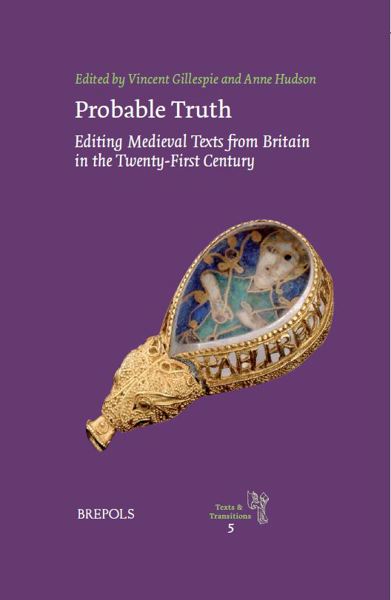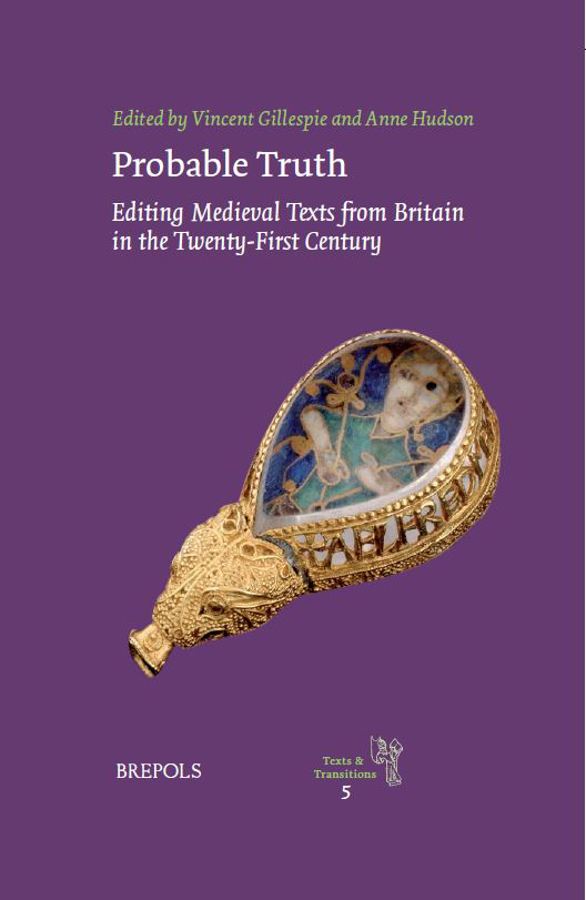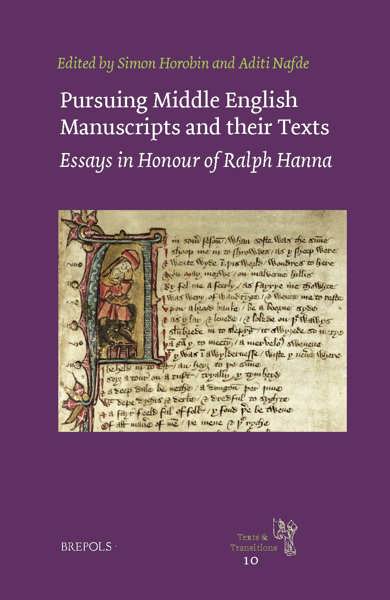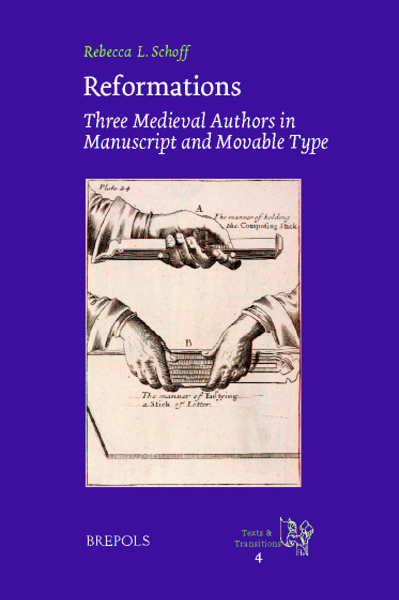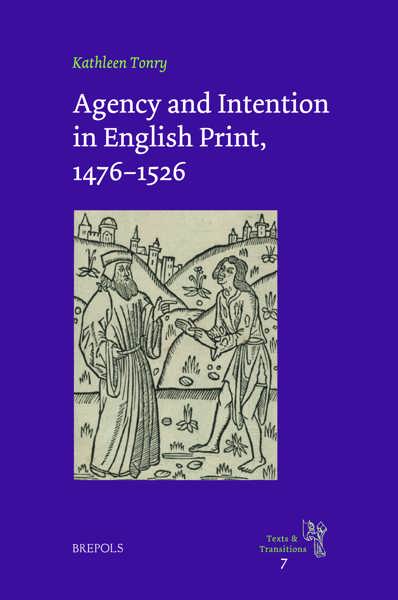
Probable Truth
Editing Medieval Texts from Britain in the Twenty-First Century
Vincent Gillespie, Anne Hudson (eds)
- Pages: xiv + 549 p.
- Size:156 x 234 mm
- Illustrations:9 b/w, 14 tables b/w.
- Language(s):English, Latin, Middle English
- Publication Year:2013
- € 160,00 EXCL. VAT RETAIL PRICE
- ISBN: 978-2-503-53683-5
- Hardback
- Available
- € 160,00 EXCL. VAT RETAIL PRICE
- ISBN: 978-2-503-54057-3
- E-book
- Available
How do the best editorial procedures of the past get transmitted to the future? In this volume a distinguished line-up of hugely experienced editors, and younger scholars actively grapple with these issues.
"Ces études constituent un sérieux ouvrage de référence, à lire lentement, à consulter fréquemment. Les avis, non toujours concordants mais solidement motivés, s'appuient toujours sur des cas concrets, détaillés, et des expériences éditoriales vécues." (Guy Bourquin, dans: Le Moyen Âge, tome CXX, 2/2014, p. 570-572)
"All of the essays assembled by Gillespie and Hudson in this volume testify to the mysterious and, for some scholars, compelling mixture of science and art that according to Housman is the discipline of the textual editor. Collectively and individually, the twenty-nine essays in Probable Truth demonstrate the need for editors of medieval texts to be adventurous, cautious, deft, imaginative, intuitive, logical, rational, and of course self-aware. That is, this book makes a case for the discipline of editing as a sophisticated variety of academic research, one that, given the amount of medieval material that requires editing and reediting, ought to stimulate the interest of more scholars and ought to command the respect of more university doctoral and promotions committees." (Michael P. Kuczynski, in: The Medieval Review, 15.06.31)
"The reader of Probable Truth will find herself with a multiplicity of answers, alongside helpful insights, useful references, and, of course, further questions. It is certainly worth clearing space for Probable Truth on any scholarly bookshelf, as it is packed with the perpetual problems of editing that persist." (Pamela Greig, in: Nottingham Medieval Studies 59, 2015, p. 195-199)
"Generally speaking, each contribution is of a high standard and, with some exceptions, connected more or less closely with the common theme: editing texts from medieval Britain." (Nicholas A. Sparks, in: Parergon 32.2, 2015, p. 382-383)
"The volume is a treasure-trove of information on current editorial theory and editorial practices. It asks several crucial questions about the state of editing, some of them linked to electronic editing in particular, and the digitalization of the humanities in general. It also offers specific case studies that offer honest accounts of the difficulties facing the most accomplished editor with his mss. Anyone interested in medieval English editing and medieval English culture will profit immensely from these excellent contributions." (D. Renevey, in: Scriptorium 2015/01, nr. 225)
"Nel complesso, la miscellanea rivela un quadro piacevolmente vivace dell’editoria scientifica dei testi della Britannia medievale" (Marina Buzzoni, in: Studi Medievali Ser. 3, 57, 1, 2016, p. 321-326)
“The large number of contributions results in excellent breadth of coverage in terms of editorial topics, with a handful of essays destined to become classics. (…) this is a landmark volume that no serious scholar of textual history should miss.” (Elaine Treharne, in Review of English Studies, Vol. 67/279, April 2016, p. 374-375)
“The editors of this volume (…) have produced an outstanding collection, remarkable for its consistently high quality across thirty essays. There is hardly a piece in the collection that one would not gladly see twice as long, or that is not worth careful discussion and genuine praise.” (R. M. Liuzza, in Speculum, 91/3, 2016, p. 785)
Introduction — VINCENT GILLESPIE AND ANNE HUDSON
The Way We Were
The Early English Text Society 1930 to 1950: Wartime and Reconstruction — H. L. SPENCER
From Script to Print to HTML: Electronic Editions
Whatever Happened to Electronic Editing? — BELLA MILLETT
Editing Electronic Texts — THORLAC TURVILLE-PETRE
Practices, Habits, Methodologies
The Architecture of Old English Editions — KATHERINE O’BRIEN O’KEEFFE
Editing Old English Prose and the Challenge of Revision: or, Why It Is Not So Easy to Edit Old English Prose — MALCOLM GODDEN
Editing Texts with Extensive Manuscript Traditions — RALPH HANNA
Composite Texts: Some Methodological Considerations — WILLIAM ROBINS
Editing Insular Song across the Disciplines: Worldes blis — ARDIS BUTTERFIELD AND HELEN DEEMING
The Optics of Ps-Grosseteste: Editing Peter of Limoges’s Tractatus moralis de oculo — RICHARD NEWHAUSER
In Praise of the Variant: Why Edit Critically?
Variants vs Variance — DEREK PEARSALL
When Variants Aren’t: Authors as Scribes in Some English Manuscripts — MATTHEW FISHER
Some Measures of Scribal Accuracy in Late Medieval English Manuscripts — RICHARD BEADLE
Editing and Correcting — DANIEL WAKELIN
What is Scribal Error, and What Should Editors Do (or Not Do) about It? — STEPHEN MORRISON
In Praise of the Variant: Why Edit Critically? A Pragmatic Viewpoint — SUSAN POWELL
Assessing Sole Attestation in Selected Middle English Textual Traditions — ROSAMUND ALLEN
Editing British Texts in Latin, Anglo‑Norman, Celtic, and Scots
Editing Older Scots Texts — SALLY MAPSTONE
Towards an Edition of the Scottish Troy Book — EMILY WINGFIELD
Textual Criticism and Baile Binnbérlach mac Búain — MICHELLE DORAN
A Medieval Welsh Version of the Troy Story: Editing Ystorya Dared — HELEN FULTON
Editing the Editor: Editorial Policy at the Anglo‑Norman Dictionary — HEATHER PAGAN AND GEERT DE WILDE
Scientific Texts
A Plea for Middle English Botanical Synonyma — DAVID MORENO OLALLA
New Software Tools for the Analysis of Computerized Historical Corpora: GUL MSS Hunter 509 and 513 in the Light of TexSEn — LAURA ESTEBAN-SEGURA AND TERESA MARQUÉS-AGUADO
Editing Alchemical Texts in Middle English: The Final Frontier? — PETER J. GRUND
Middle English Case Studies
Why Edit the Middle English Prose Brut? What’s (Still) in It for Us? — JOHN J. THOMPSON
Parallel Texts and a Peculiar Brut: A Case Study — MARIE STANSFIELD
New Challenges to the Editing of Chaucer — ORIETTA DA ROLD
‘Let Copulation Thrive’: Some Varieties of Contamination in the Textual Tradition of Piers Plowman — A. V. C. SCHMIDT
Editing Walter Hilton’s Scale of Perfection: The Case for a Rhizomorphic Historical Edition — MICHAEL G. SARGENT
Index of Manuscripts
Index of Names, Places, and Texts
